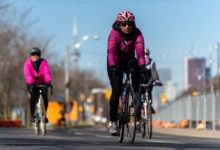John Tory says COVID-19 pandemic will cost Toronto $1.5B
Toronto officials reported 249 new cases of COVID-19 on Thursday, as the city continues to grapple with deaths and daily new cases of the novel coronavirus.
Dr. Eileen de Villa, the city’s medical officer of health, reported that 522 have now died of the virus in Toronto.
There are 397 people in hospital with 102 in intensive care units due to COVID-19, she added, figures that both increased slightly from Wednesday.
The city says there is a total of 6,914 cases, and 4,364 people have recovered.
De Villa announced the new numbers at a news conference at city hall on Thursday, joined by Toronto Mayor John Tory and Toronto Fire Chief Matthew Pegg, head of the city’s emergency response team.
De Villa also reported that 13 staff and seven children have now tested positive at the Jesse Ketchum Early Learning and Child-care Centre, one of the city’s seven licensed locations providing care for the children of essential and critical- care service workers.
The new numbers represent an increase from de Villa’s update last week, when she reported six positive cases among staff and a single positive case affecting a child at the centre.
One staff member has also tested positive at the city’s Falstaff Early Learning and Child Care Centre, de Villa said, adding that no children are currently showing signs or symptoms of COVID-19.
Pandemic to cost city $1.5B, Tory says
Meanwhile, Tory is calling on the federal government to provide funding to municipalities across the country.
Tory says city staff have “crunched the numbers” and determined that under a best case scenario, the pandemic will cost Toronto $1.5 billion.
“We need immediate federal funding so that we can keep people safe and then be ready to drive Canada’s economic recovery,” Tory said Thursday.
“We have serious problems as cities,” Tory added, which he said will be key to the country’s economic recovery.
While Tory said there hasn’t been confirmation from the federal government for additional funding, he said “active discussions” are underway.
At the city’s first virtual Board of Health meeting Thursday, there was unanimous approval of a motion to request both provincial and federal support for Toronto’s COVID-19 response, de Villa said.
That funding will advance Toronto’s “important work” in curbing cases of the virus, while continuing to address challenges including housing affordability, access to social services and use of public space, the city said in a news release issued Thursday.
ActiveTO details expected this week
These updates come one day after the mayor announced a new plan called ActiveTO, in which city staff will create more space for people to get outside and move around safely.
As part of the new plan, the city says it will create 50 kilometres of “quiet streets,” which will be closed to all but local traffic, as well as additional cycling infrastructure.
Although the city hasn’t yet confirmed which streets will be closed, they are expected to include major roads near trails and attractions where there has been crowding.
The goal of the project, the city said, is to encourage outdoor activity while maintaining physical distancing requirements.
The city is expected to provide additional details of the plan this week.

Meanwhile, advocates are calling on the city to reopen some of Toronto’s green spaces, not just city streets.
Jennifer Keesmaat, the city’s former chief city planner, says funnelling people into smaller spaces jeopardizes public safety.
“If the goal is safety and public health and we recognize being outside is not a bad thing, it’s a good thing, then we need more space outside, not less,” she told CBC Toronto.
“Constraining the space in the city where the public can safely socially distance or physically distance is actually counterintuitive, it creates a problem rather than solving a problem.”
CBC







Redes Sociais - Comentários